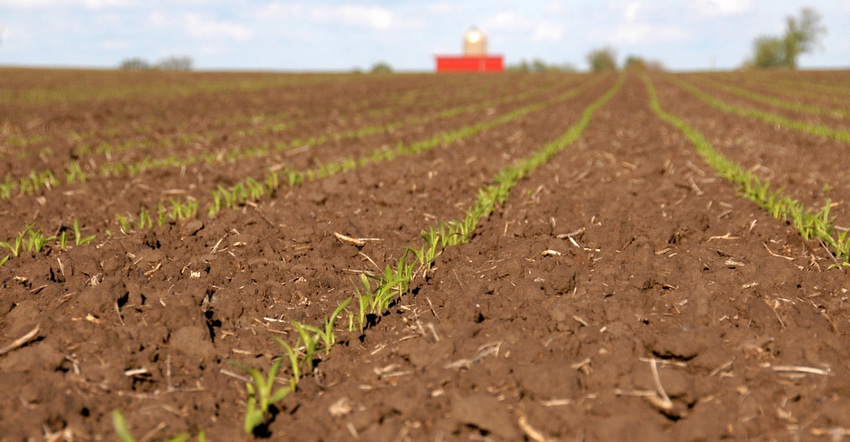April 14, 2021

Compaction threat is real
Two facts for your spring planting notebook:
• Roughly 80% of compaction occurs on your first pass.
• Severe compaction can cause losses of up to 60%.
That’s according to Pioneer agronomist Jonathan Rotz, who adds you can reduce compaction odds by avoiding working wet soils, controlling wheel traffic, and increasing tire surface area by employing larger-diameter tires with lower inflation.
Hitting the same path more than once may create more compaction in that area, but it will also make it easier to fix in the future. The natural cycle of freeze-thaw and wet-dry can help alleviate some soil compaction, but Rotz also recommends a few other remedies, including planting deep-rooted perennials like alfalfa. For more serious compaction, cautious tillage may be necessary to break up the soil.
Why cautious? Tilled soils are more easily compacted than non-tilled soils — something to remember the next time around, too.
Calling all livestock kids
Young Illinois livestock producers have a new opportunity this summer to develop their leadership skills around their favorite species. The Illinois Livestock Leadership Institute will be held June 28 to July 1 in Des Moines, Iowa. Organizers say the event will be hands-on and will focus on leadership, citizenship and communications skills.
Formerly known as the Illinois Pork Leadership Institute, the ILLI is a newly combined effort of the Illinois Pork Producers, Illinois Beef Association and Midwest Dairy.
Only 27 young people ages 16 to 20 will be selected to learn about pork, beef and dairy production, research, consumer preferences and other issues that affect the livestock industry. Participants don’t need to come from a livestock production background but “must exhibit a sincere interest in the livestock industry and agriculture.”
The cost is $150 to attend. Online applications close May 21.
Soybeans lead 2020 exports
Total U.S. ag exports in 2020 topped nearly $146 billion, up nearly 7% from 2019. That’s the second-highest level on record after 2014, according to USDA’s Foreign Agricultural Service.
According to the Illinois Soybean Association, the primary factor for the export surge was increased shipments of soybeans, corn and pork to China.
Soybeans held the top spot in U.S. ag exports, increasing 38% to a record $25.7 billion in 2020 and accounting for almost 18% of total U.S. ag exports. Nearly 55% of all soybean exports in 2020 went to China, returning to levels prior to the trade war.
FAS says soybean shipments are back on trend this year, with large sales shipping out in late 2020 and early 2021.
Illinois led the nation in soybean production in 2020, raising 605 million bushels on 10.25 million acres at an average yield of 59 bushels per acre.
SIU students promote grain bin safety with ‘Silo’ movie
Close to Marion, Ill.? Check out a free drive-in movie screening of the “Silo” movie on Saturday (April 17). Two showings begin at 6 p.m. and 8 p.m., and gates open at 5 p.m. and 7:20 p.m., respectively at the Oasis Drive-In Theatre, 3000 W. DeYoung St. in Marion, Ill. Bring your own lawn chair!
The “Silo” movie debuted at the 2019 Farm Progress Show and was developed following a tragic grain entrapment in northern Illinois that killed two young men in 2010.
The movie is presented by the Southern Illinois University Collegiate Farm Bureau. For questions or more information, contact Alex Hartke at 217-663-5654 or [email protected].
Wanted: Soybean leaders
The Illinois Soybean Association is holding elections this year for six seats on its 18-seat board of directors. The six seats have incumbents who are eligible for additional terms. Board members are elected to three-year terms and can serve three terms.
Here are the districts and the counties they include:
• District 2. Cook, DuPage, Kane, Kankakee, Lake, McHenry and Will counties
• District 10. Christian, DeWitt, Macon, Moultrie and Shelby counties
• District 11. Champaign, Coles, Douglas, Edgar and Piatt counties
• District 14. Clark, Crawford, Cumberland, Effingham and Jasper counties
• District 16. Clay, Edwards, Lawrence, Richland, Wabash, Wayne and White counties
• District 17. Jackson, Jefferson, Perry, Randolph and Washington counties
To serve, candidates must be of legal voting age, must contribute to the soybean checkoff, reside in the district and maintain eligibility throughout their term. To get your name on the ballot, file a petition with the Illinois Department of Agriculture by May 15, including signatures of at least 250 qualified producers in the district or 5% of the farmers in the district, whichever is less. Request a petition from Dustin Scott, ISA director of operations, at [email protected] or call 309-808-3603.
On the national level, the American Soybean Association is also accepting applications for two director positions, each for a three-year term. Candidates must be members of ISA, must grow soybeans and should complete the online application by July 16.
You May Also Like




